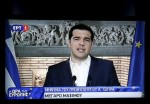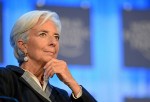
By Alice Ollstein in Think Progress – Angry graffiti scrawled across the brightly colored buildings of San Juan tells the creditors of the world exactly where they can stick their plan to extract roughly $73 billion in debt from the struggling U.S. territory. “Puerto Rico comes first. To hell with the debt,” reads one wall. “Don’t play around with my retirement,” says the side of a major freeway. Down by the University of Puerto Rico, the walls and sidewalk are filled with laments — “Look into my unemployed face” — and calls to action: “Study and fight!” Depending who you ask in Puerto Rico, the debt crisis was caused by neo-colonial and imperialist policies from the U.S., the Puerto Rican government’s wasteful overspending and corruption, or the cadre of hedge funds that are currently profiting from the island’s woes.

By George Lakey in Waging Nonviolence – After dining on cod on July 7, European leaders representing the economic elites went back to work figuring out how to run over the Greek majority in Europe’s first democracy. The serving of cod, presumably from Iceland, is ironic considering that it was the Icelanders who six years ago defied European investors — and by doing so saved their economy and bolstered their well-being. Movements for justice around the world have much to learn from keeping in mind both of these national dramas. When Iceland’s 1 percent brought the economy to its historic crisis in 2008, Icelanders could not get any money from their ATMs. It was the worst economic collapse in Europe since World War II.

By Gregory Katz in AP. KARITAINA, Greece (AP) — Ilias Mathes has protection against bank closures, capital controls and the slashing of his pension: 10 goats, some hens and a vegetable patch. If Greece’s financial crisis deepens, as many believe it must, he can feed his children and grandchildren with the bounty of the land in this proud village high in the mountains of the Arcadia Peloponnese. “I have my lettuce, my onions, I have my hens, my birds, I will manage,” he said, even though he can no longer access his full pension payment because of government controls imposed six days ago. “We will manage for a period of time, I don’t know, two months, maybe three months, because I also want to give to our relatives. If they are suffering, I cannot leave them like this, isn’t that so?”

By Jerome Roos in RoarMag – Tuesday marked the deadline for Greece to transfer a 1.6 billion euro debt repayment to the IMF. The country’s Finance Minister Yanis Varoufakis had already announced that his government could not — and would not — pay. And so, at 6pm Washington-time, 1am locally, Greece officially defaulted on the IMF. The default is an unprecedented event in the history of finance: never before has a developed country fallen into arrears on a loan from the Fund. Unsurprisingly, the international press is already conjuring up unflattering comparisons with notorious failed states like Zimbabwe and Somalia, which are among the few countries to have gone down the same path of utter financial ignominy.

By C J Polychroniou in TruthOut. Negotiations between Greece and its official creditors – the European Commission, International Monetary Fund (IMF) and European Central Bank – are currently in renewed deadlock. Yet, only a few days ago, in the Euro summit on Monday, June 22, all indications were that Europe’s political beasts and the “criminal IMF” were ready to accept thelatest capitulation on the part of the Greek leftist government, which, since coming to power in late January, has spent a lot of time doing nothing more than “yelling, kicking and screaming” against austerity and the bailout program (and treating senior-level EU officials with disdain in public as part of its well-orchestrated populist theatrics) while at the same time seeking to assure Greece’s euro partners that it is committed to keeping the country in the euro area and that it would fulfill all its obligations to the creditors.

By Ruadhán Mac Cormaic in Irish Times – From the steps of the imposing parliament building, Katherina Sergidou gestures at the swelling crowd that stretches out across Syntagma Square, filling the night sky with defiant chants. “We’re here to show there are a lot of us,” she says proudly. “A big window has opened – a window of change.” On the eve of an emergency EU summit aimed at striking an 11th-hour deal to end the stand-off between Greece and its lenders, thousands took to the streets of Athens last night to keep up the pressure on Greece’s government, led by the left-radical Syriza, and to show defiance in the face of pressure from the EU and the IMF. The protest, organised by left-wing parties and trade unions, was also designed as a response to a right-wing protest held in the city at the weekend.

By Aditya Tejas in International Business Times – The International Monetary Fund (IMF) said in a new report that income inequality is harming economies around the world, calling it the “defining challenge of our time.” The Monday study, which was the result of research from five IMF economists, drew attention to the issue of global inequality, dismissed “trickle-down” economics and urged governments to target policies toward the bottom 20 percent of their citizens. The study surveyed advanced, emerging and developing economies from 1980 to 2012, and found that inequality was exacerbated by technological progress, weakened labor groups, globalization and regressive tax policies. Weakened labor market laws were found to be associated with a boost in the income of the richest 10 percent.

Ahead of President Obama’s trip to Jamaica this week, a new paper from the Center for Economic and Policy Research (CEPR) finds that Jamaica is running the most austere budget in the world, with a primary surplus of 7.5 percent, due to its IMF agreement, and that the government’s interest payments on the debt and austerity have brought public investment to a low. The paper, “Partners in Austerity: Jamaica, the United States and the International Monetary Fund” by Jake Johnston, notes that Jamaica has a debt-to-GDP ratio of nearly 140 percent and its public interest burden is one of the very highest in the world, at over 8 percent of GDP last year.

Night demonstrations — a fixture in the 2012 Quebec student movement — were held on Tuesday in Montreal and Quebec City, and again on Friday in Montreal, with thousands filling the streets as well as hundreds of armoured police. The mobilization against austerity measures was met by strong police reaction. On Thursday of the same week, the Quebec Liberal government tabled a budget “balanced” by large cuts to education, health care and other social services spending. A Popular Protest Against Austerity and the Petro-Economy was held on Saturday March 21 with between 5,000 – 10,000 taking to the streets of Montreal. The event was repeated with another large turnout on Saturday, March 28, with more protests held in Montreal and around Quebec.

As labor unions have declined in most countries around the world, CEO paychecks have ballooned. And that’s not just a coincidence, according to new research from the International Monetary Fund. In the latest issue of the IMF’s Finance & Development journal, researchers Florence Jaumotte and Carolina Osorio Buitron give a preview of their forthcoming study on the links between unionization rates and inequality. Jaumotte and Osorio Buitron also dare to point out that “top earners’ compensation may be larger than what is justified by their contribution to the economy’s output.”Their article — entitled, I kid you not, “Power from the People” — notes that “weaker unions can reduce workers’ influence on corporate decisions that benefit top earners, such as the size and structure of top executive compensation.”

The recent IMF loans to Ukraine with their dictatorial provisions are one more example of the world’s concealed great war, which is to say the massive invasion of nationhood by corporations. Far more dangerous than any current military threat, corporations have already taken huge territories, legal and financial as well as geographical. Our politicians, many of them covert allies of the corporations, say little of this. And the major media, massive corporations themselves, steadfastly hide the truth from their audience. For America, not since the Civil War has the sovereignty and constitution of this land come under such assault. In the two previous great wars the damage mostly occurred across two great oceans. Now the victims of the battle are in the heart of our land, witness the deleterious economic effects of NAFTA, the political disaster of Citizens United and the corporate assault on our public schools parading as education reform.

As unusual as it may seem, this appointment is consistent with what looks more like a takeover of the Ukrainian economy by Western interests. In two reports – The Corporate Takeover of Ukrainian Agriculture and Walking on the West Side: The World Bank and the IMF in the Ukraine Conflict – the Oakland Institute has documented this takeover, particularly in the agricultural sector.The Ministry of Finance went to Natalie Jaresko, a U.S.-born and educated businesswoman who has been working in Ukraine since the mid-1990s, overseeing a private equity fund established by the U.S. government to invest in the country.

Finally, a little-known aspect of the crisis in Ukraine is receiving some international attention. On July 28, the California-based Oakland Institute released a report revealing that the World Bank and the International Monetary Fund (IMF), under terms of their $17 billion loan to Ukraine, would open that country to genetically-modified (GM) crops and genetically-modified organisms (GMOs) in agriculture. The report is entitled “Walking on the West Side: the World Bank and the IMF in the Ukraine Conflict.” [1] In late 2013, the then president of Ukraine, Viktor Yanukovych, rejected a European Union association agreement tied to the $17 billion IMF loan, whose terms are only now being revealed. Instead, Yanukovych chose a Russian aid package worth $15 billion plus a discount on Russian natural gas. His decision was a major factor in the ensuing deadly protests that led to his ouster from office in February 2014 and the ongoing crisis. According to the Oakland Institute, “Whereas Ukraine does not allow the use of genetically modified organisms (GMOs) in agriculture, Article 404 of the EU agreement, which relates to agriculture, includes a clause that has generally gone unnoticed: it indicates, among other things, that both parties will cooperate to extend the use of biotechnologies. There is no doubt that this provision meets the expectations of the agribusiness industry. As observed by Michael Cox, research director at the investment bank Piper Jaffray, ‘Ukraine and, to a wider extent, Eastern Europe, are among the most promising growth markets for farm-equipment giant Deere, as well as seed producers Monsanto and DuPont’.” [2]

The student petition stated, the IMF has promoted policies that have hurt the poor, and strengthened “imperialist and patriarchal systems that oppress and abuse women worldwide.” Selecting Lagarde, therefore, goes “directly against Smith’s values to stand in unity with equality for all women, regardless of race, ethnicity or class.” It would be one thing if the economic policies pushed by the IMF that have been so devastating to so many people around the world were safely in the past. But, unfortunately, they are not. Look at the $17 billion IMF loan to “help” Ukraine in its time of need. Approved at the end of April, the IMF package comes with many of the usual strings attached, including cuts to pensions, subsidies and social services that benefit poor and working people. In essence, it’s hawking the tired austerity measures that have exacerbated the economic crises in Spain, Greece and so many other places.

Very soon, the IMF will cease to be the world’s only organization capable of rendering international financial assistance. The BRICS countries are setting up alternative institutions, including a currency reserve pool and a development bank. The BRICS countries (Brazil, Russia, India, China and South Africa) have made significant progress in setting up structures that would serve as an alternative to the International Monetary Fund and the World Bank, which are dominated by the U.S. and the EU. A currency reserve pool, as a replacement for the IMF, and a BRICS development bank, as a replacement for the World Bank, will begin operating as soon as in 2015, Russian Ambassador at Large Vadim Lukov has said. Brazil has already drafted a charter for the BRICS Development Bank, while Russia is drawing up intergovernmental agreements on setting the bank up, he added. In addition, the BRICS countries have already agreed on the amount of authorized capital for the new institutions: $100 billion each. “Talks are under way on the distribution of the initial capital of $50 billion between the partners and on the location for the headquarters of the bank. Each of the BRICS countries has expressed a considerable interest in having the headquarters on its territory,” Lukov said.
|
|














